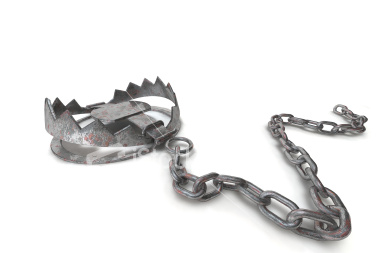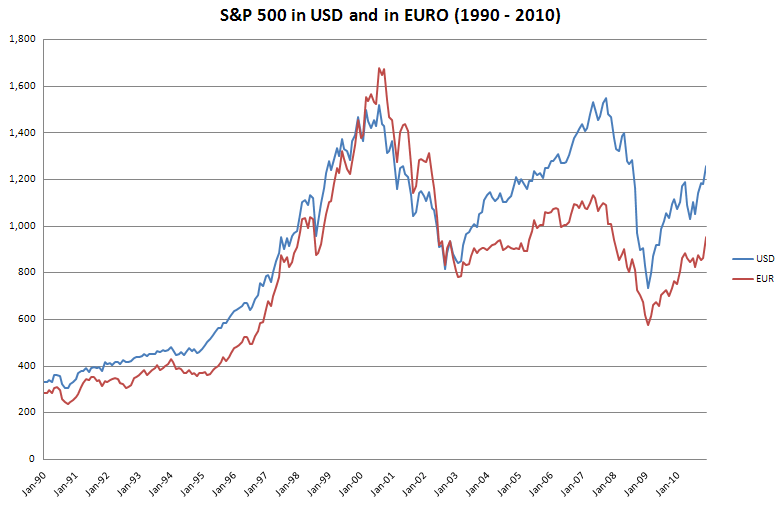Investing International
Currencies Impact Stock Market Profits
Submitted by Van Beek on February 1, 2015 - 15:592015 started with an eventful January. The continued decline of the Euro versus the US Dollar had a major impact on the stock markets around the world.
During January, the German DAX gained 9.1% and the S&P 500 lost 3.1%.
However, this is before taking into account the impact of currency price developments.
Measured in Euros, the German DAX gained 9.1% during January. However, measured in US Dollars the DAX only gained 1.7% during January.
Measured in US Dollars the S&P 500 lost 3.1% during the month. However, measured in Euros, the S&P 500 gained 3.9%.
Stock Market Profits in Dollars and Euros
European investors gained during January, regardless if they invested at home or in the US markets.
Nikkei Gains and Yen Losses
Submitted by Van Beek on March 30, 2013 - 14:09About half of our Stock Trend Investing members invest just in the U.S. markets. The other half invest internationally. You need to know a few things extra when you want to invest your savings in international markets compared to when you invest domestically only. At Stock Trend Investing, we want to help in you in getting the required understanding and insight.
When 7 is Less than 4
Submitted by Van Beek on February 3, 2013 - 06:07When the Japanese Nikkei gained 7.2% during January and the NASDAQ gained 4.1%, you are mistaken when you think that the Nikkei would have made you more money. Yes, you are reading this right. In this case 7.2% is not more but less than 4.1%. I will explain.
To be able to see how 7.2% can be less than 4.1%, you have to take into account the currency that the stock market index is nominated in. The value of the NASDAQ is measured in U.S. Dollars. The value of the Japanese Nikkei index is measured in Japanese Yen.
Thus during January, the NASDAQ gained 4.1% measured in U.S. Dollars. And the Nikkei gained 7.2% measured in Japanese Yen.
Why Invest in International Stock Markets
Submitted by Van Beek on March 21, 2012 - 07:46
There are two main reasons why you could consider investing in international stock markets:
- Chasing the higher returns in foreign markets.
- Escaping the decline in value of your home currency.
Study This Strategy Before You Invest In Foreign Stock Markets
Submitted by Van Beek on November 24, 2011 - 13:59
In one of our previous blog posts we have seen what the trap is you can fall in when you invest in foreign stock markets. In this post you will learn a strategy for how to avoid that trap.
The unique catch that foreign stock markets pose to an investor is the currency risk. When we talk now here about foreign stock markets, we assume that these markets use a different currency than the currency in your home country.
Now here is the principle rule:
Avoid This Trap When Investing in Foreign Stock Markets
Submitted by Van Beek on October 17, 2011 - 08:35
When you invest your savings in foreign stock markets, you can still lose money despite markets going up. The risk here is the currency trap. Read on to understand this trap and how to avoid it.
Imagine the following situation. You have invested some of your savings in a foreign stock market. The reason is that you expected that market to go up much more than the stock markets at home. And you invested in the safest possible way:
Geographical Diversification Lessons from Index Investing for Dummies
Submitted by Van Beek on April 26, 2011 - 08:09
Get the benefits from a global geographical diversified portfolio of index funds
Once your stock investing portfolio is large enough, you can easily use index funds to diversify your investments over different regions in the world. Such a diversification has a few advantages that we will list below.
Here are four reasons for diversifying your stock investments geographically around the world:
What is the Euro-Dollar Impact on Your S&P 500, DAX and Gold Investments?
Submitted by Van Beek on January 5, 2011 - 11:45
Without Market Timing, Euro investments in the S&P 500 do not provide good returns.
Currently the Euro is 16% weaker versus the US Dollar compared to its top in July 2008. At that top, the Euro was 81% more valuable than at its bottom in February 2002.
This currency rollercoaster can have a major impact on your investing returns when you invest your savings overseas. Foreign currency fluctuations can amplify your returns or annihilate them.




